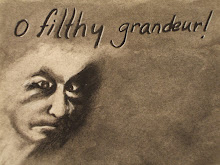I have just finished reading David Gemmell's Dark Moon, which was loaned to me by a friend who assured me that I would enjoy it. Normally I don't take these sorts of suggestions from people, since they seem to miss the mark completely when assuming what I would like, and often these suggestions come to me from people who have only read one or two books in their life and are only suggesting a book to me because their 14-year-old daughter is enamored with it (that's right, I'm boycotting Twilight, so shut the hell up already). However, this book was actually tolerable. I am willing to admit, also, that my liking of it may have something to do with having previously read The Elenium. Comparitively, Dark Moon was quite refreshing, as one of the main characters was a woman who kicked ass (but, not quite enough, as I will demonstrate).
As with all my analyses, there is a SPOILER ALERT.
I don't believe that it was David Gemmell's aim to create a feminist character through Karis, since there are some revealing parts of her I would call flawed. She's not excessively feminine, but she began her military career as the whore of a commander, and through her creativity and imagination in battle she eventually became the general of an army.
She is also hyper-sexualized, having so many lovers that she cannot remember them all (93). She doesn't allow herself to fall in love with any of them, using them only to satisfy a physical need. She is almost manly in her sexual exploits, and (thankfully) the male characters do not scorn her for her "appetites," but praise her as they would a man who had many partners.
Her behavior seems to stem from her hatred of her father, a typical formula for masculinized women in many fantasy stories (here I'm thinking of Azhure from Sara Douglass' Wayfarer Redemption series). Karis' father was physically abusive to her and her mother, and she avoided loving anyone because her mother married for love, and she saw what that got her.
She's reckless, and prone to excessive drinking. Toward the end of the novel she becomes sick of fighting, and only by her sacrifice do the seemingly unstoppable Daroth leave the city.
But we never see her fight. She destroys Daroth pursuers by starting an avalanche, an indirect way of killing. She leads men in the final battle as their General, and through her military genius she devises strategies and weapons to fight against the giant immortal parasites known as the Daroth who refuse to coexist. The only way we know of her fighting is through the words and perceptions of men who admire her, such as the father-figure of Necklen talking to Duke Albreck, assuring him that he was wise in his choice of Karis for his General (262).
Even during the final battle she does not take part in the fighting. I get the reasons: the Daroth are telepaths and she doesn't want them finding out what she's planned so she and the weapons master stay away from the fighting, but it's still a little disappointing. The only evidence that she's a great warrior is filtered through the mouths of men in narrated flashbacks, as when Necklen tells Karis's previous lover, Giriak, how she became a warrior because she was once a whore to a commander. She had more imagination than he did, and proved to be a better commander (200).
Her nicknames include "The Whore of War" (320) and "The Ice Queen" (347). Supposedly this last is supposed to be better than the first; but do I really need to point out what is wrong with these "endearing" titles?
Overall, the novel itself was entertaining and while I do not believe it was David Gemmell's aim to create a feminist character, he did include a strong female character who got to boss around the men, but even in her strength she was lacking. I can see how one may argue that she's feminist, but I do have to disagree since the reader never actually witnesses this strenth directly...what we do see firsthand are her faults: her excessive drinking and use of men (which isn't really a fault except for her emotional detachment due to having a dysfuntional father).
Works Cited:
Gemmell, David. Dark Moon. New York: Ballantine Books, 1996.
Friday, January 9, 2009
The Ice Queen
Posted by FilthyGrandeur at 1/09/2009 12:53:00 PM
Labels: dark moon, david gemmell, Karis
Subscribe to:
Post Comments (Atom)


1 comments:
I am also boycotting twilight!
congratulations on the promotion, btw.
i miss you,
m.
Post a Comment